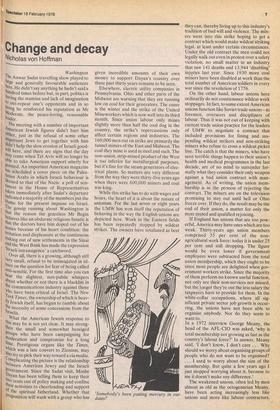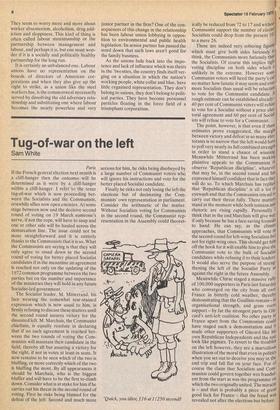Change and decay
Nicholas von Hoffman
Washington :the Anwar Sadat travelling show played to large and generally favourable audiences Ilere. He didn't say anything he hadn't said a hundred times before but, in part, politics is having the stamina and lack of imagination to out-repeat one's opponents and in so 4,.°Ing he reinforced his reputation as Mr !'lloderate, the peace-loving, reasonable leader.
His meeting with a number of important Merican Jewish figures didn't hurt him elther, just as the refusal of some other eon Portant Jews to get together with him th.dn't help the slow erosion of Israeli goodwill here, and there are signs that the day may come when Tel Aviv will no longer be able to take American support utterly for granted. An important American magazine has scheduled a cover piece on the Pales!Mien Arabs in which Israeli behaviour is nkened to that of the Nazis: a poll of sentiment in the House of Representatives !aken immediately after Sadat's departure ladicated a majority of the members put the the gossip for the present impasse on Israel. the gossip running about Washington is that the reason the graceless Mr Begin behaves like an obdurate religious fanatic is that the doctors have him doped out of his !eOses because of his heart condition: the Irritation and displeasure at the continuous staking out of new settlements in the Sinai !ad the West Bank has made the expression Israeli intransigence' a catchword. Over all, there is a growing, although still very small, refusal to be intimidated in silence on the question for fear of being called teori-semitic. For the first time also you can near the slightest, non-public whispers the communications whether or not there is a blacklist in "le communications industry against those Who have been critical of Israel. The New b f ork Times, the ownership of which is heav4 Jewish itself, has begun to rumble about he necessity of some concessions from the Israelis.
What the American Jewish response to
`ms may be is not yet clear. It may strengthen the small and somewhat beseiged groups who have been campaigning for inoderation and compromise for a long time. Prestigious organs like the Times, which was a late convert to Zionism, may r‘a So try to pick their way toward a via media.
rinplicating the picture is the relationship "etween American Jewry and the Israeli g,sovernment. Since the Sadat visit, Moshe uaYan has been telling them to keep their two cents out of policy making and confine their activities to cheerleading and support of the spiritual fatherland. Whether that Proposition will wash with a group who has
given incredible amounts of their own money to support Dayan's country over these past thirty years remains to be seen.
Elsewhere, electric utility companies in Pennsylvania. Ohio and other parts of the Midwest are warning that they are running low on coal for their generators. The cause is the winter and the strike of the United Mineworkers which is now well into its third month. Since union labour only mines slightly more than half the coal dug in the country, the strike's repercussions only affect certain regions and industries. The 160,000 men out on strike are primarily the tunnel miners of the East and Midwest. The coal they mine is used in steel and such. The non-union, strip-mined product of the West is too inferior for metallurgical purposes, but it's fine for the steam generators of electrical plants. So matters are very different from the way they were thirty-five years ago when there were 600,000 miners and coal was king.
While this strike has to do with wages and hours, the heart of it is about the nature of unionism. For the last seven or eight years, the UMW has won itself the reputation of behaving in the way the English unions are depicted here. Work in the Eastern fields has been repeatedly stopped by wildcat strikes. The owners have retaliated as best they can, thereby living up to this industry's tradition of bad will and violence. The miners went into this strike hoping to get a contract which would make wildcestriking legal, at least under certain circumstances. Under the old contract the men could not legally walk out even in protest over a safety violation, no small matter in an industry that saw 141 deaths and 13,944 `disabling' injuries last year. Since 1930 more coal miners have been disabled at work than the total number of American soldiers in every war since the revolution of 1776.
On the other hand, labour unions here ordinarily do not countenance wildcat work stoppages. In fact, to some extent American unions function like Soviet trade unions — as foremen, overseers and discipliners of labour. Thus it was not out of keeping with current trade union prac.tice for the leaders of UMW to negotiate a contract that included provisions for fining and suspending wildcat strikers and non-striking miners who refuse to cross a wildcat picket line. The catch is that the miners, who have seen terrible things happen to their union's health and medical programmes in the last decade, are of no mind to surrender formally what they consider their only weapon against a bad union contract with management. As of writing, the union membership is in the process of rejecting the contract. The miners are on the television promising to stay out until hell or Ohio freeze over. If they do, the result may be the end of their union, a matter for only the most muted and qualified rejoicing.
If England has unions that are too powerful, America may have ones which are too weak. Thirty-years ago union members comprised 35 per cent of the nonagricultural work force: today it is under 25 per cent and still dropping. The figure would be even lower if government employees were subtracted from the total union membership, which they ought to be since most people are delighted when government workers strike. Since the majority of them perform no known useful function, not only are their non-services not missed, but the longer they're out the less salary the taxpayers have to provide for them. In the white-collar occupations, where all significant private sector job growth is occurring, the unions have not been able to organise anybody. Nor do they seem to want to.
In a 1972 interview George Meany, the head of the AFL-CIO was asked, `why is total membership not growing as fast as the country's labour force?' In answer, Meany said, 'I don't know, I don't care . . . Why should we worry about organising groups of people who do not want to be organised? . . . I used to worry about the size of the membership. But quite a few years ago I just stopped worrying about it, because to me it doesn't make any difference.'
The weakened unions, often led by men almost as old as the octogenarian Meany, have been acting increasingly less like unions and more like labour contractors. They seem to worry more and more about worker absenteeism, alcoholism, drug addiction and sloppiness. This kind of thing is often called labour statesmanship or the partnership between management and labour, and perhaps it is, but one must wonder if it is a socially and politically healthy partnership for the long run.
It is certainly an unbalanced one. Labour unions have no representation on the boards of directors of American corporations and when they also give up the right to strike, as a union like the steel workers has, is the commonweal necessarily served by dissolving the old adversary rela tionship and substituting one where labour becomes the nearly powerless and very junior partner in the firm? One of the consequences of this change in the relationship has been labour union lobbying in opposition to environmental and public health legislation. Its senior partner has passed the word down that such laws aren't good for the family business.
As the unions fade back into the impotence and lack of influence which was theirs in the 'twenties, the country finds itself verging on a situation in which the nation's working people, white collar and blue, have little organised representation. They don't belong to unions, they don't belong to political parties. They have become personnel particles floating in the force field of a triumphant corporatism.



































 Previous page
Previous page